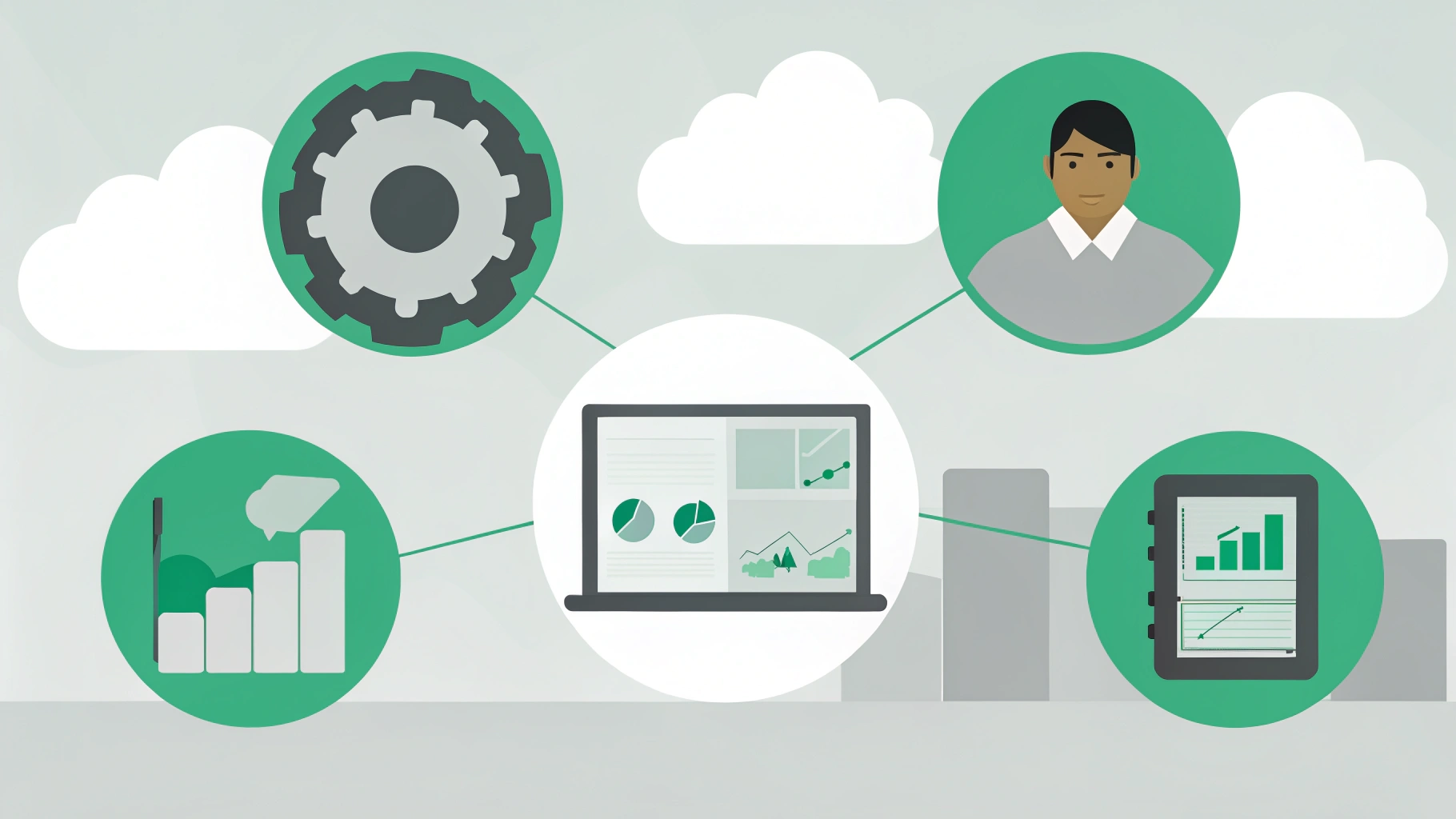Overview
An ERP system is defined as a comprehensive software platform that integrates various business functions, including finance, human resources, and supply chain management, to optimize operations and enhance decision-making. This definition is supported by detailing the key features and historical evolution of ERP systems. Notably, modern cloud-based solutions like 10X ERP significantly improve efficiency, data accuracy, and overall business agility. By leveraging these advanced systems, organizations can streamline their processes and make informed decisions that drive success.
Introduction
Understanding the intricacies of Enterprise Resource Planning (ERP) systems is essential for businesses aiming to streamline operations and enhance decision-making. These comprehensive software platforms integrate various functions—from finance to supply chain management—providing organizations with the tools to optimize their processes effectively. However, as companies navigate the complexities of digital transformation, they often face significant challenges in implementing ERP solutions.
What are the critical features that distinguish successful ERP systems? How can businesses leverage these features to drive growth and efficiency?
Define ERP: Understanding Enterprise Resource Planning Systems
Enterprise Resource Planning (ERP) solutions illustrate the ERP system meaning as comprehensive software platforms that organizations utilize to oversee and automate essential business processes. By integrating functions across finance, human resources, supply chain, and stock management, these frameworks illustrate the ERP system meaning, facilitating seamless information exchange that enables businesses to optimize operations and enhance decision-making. The transition towards cloud-based ERP solutions has transformed the landscape, illustrating the ERP system meaning by providing real-time data access and collaboration capabilities from any location. This is particularly beneficial for growing distributors. For instance, 10X ERP, a modern cloud-based ERP solution, exemplifies how cloud technology can enhance operational efficiency.
With features such as real-time data processing, adaptable user permissions, an intuitive interface, swift onboarding, and smooth API integrations, 10X ERP empowers distributors to improve stock management and increase operational flexibility. Moreover, the transparent pricing structure ensures businesses comprehend the value they receive as they expand. The ERP system meaning is reflected in the fact that companies adopting ERP solutions report a 24% enhancement in order fulfillment speed and a 22% rise in stock accuracy, leading to improved customer satisfaction and reduced operational expenses.
Furthermore, 95% of organizations implementing the ERP system meaning experience improved processes, and 70% of companies that adopt ERP assert it has facilitated smoother growth. Additionally, 40% of users notice a significant enhancement in customer satisfaction after implementing what is referred to as the ERP system meaning, underscoring the crucial role these solutions play in fostering efficiency and agility in today’s competitive marketplace. However, it is vital to recognize that nearly one-third of digital transformation efforts falter due to challenges related to the ERP system meaning, emphasizing the necessity for meticulous planning and execution.
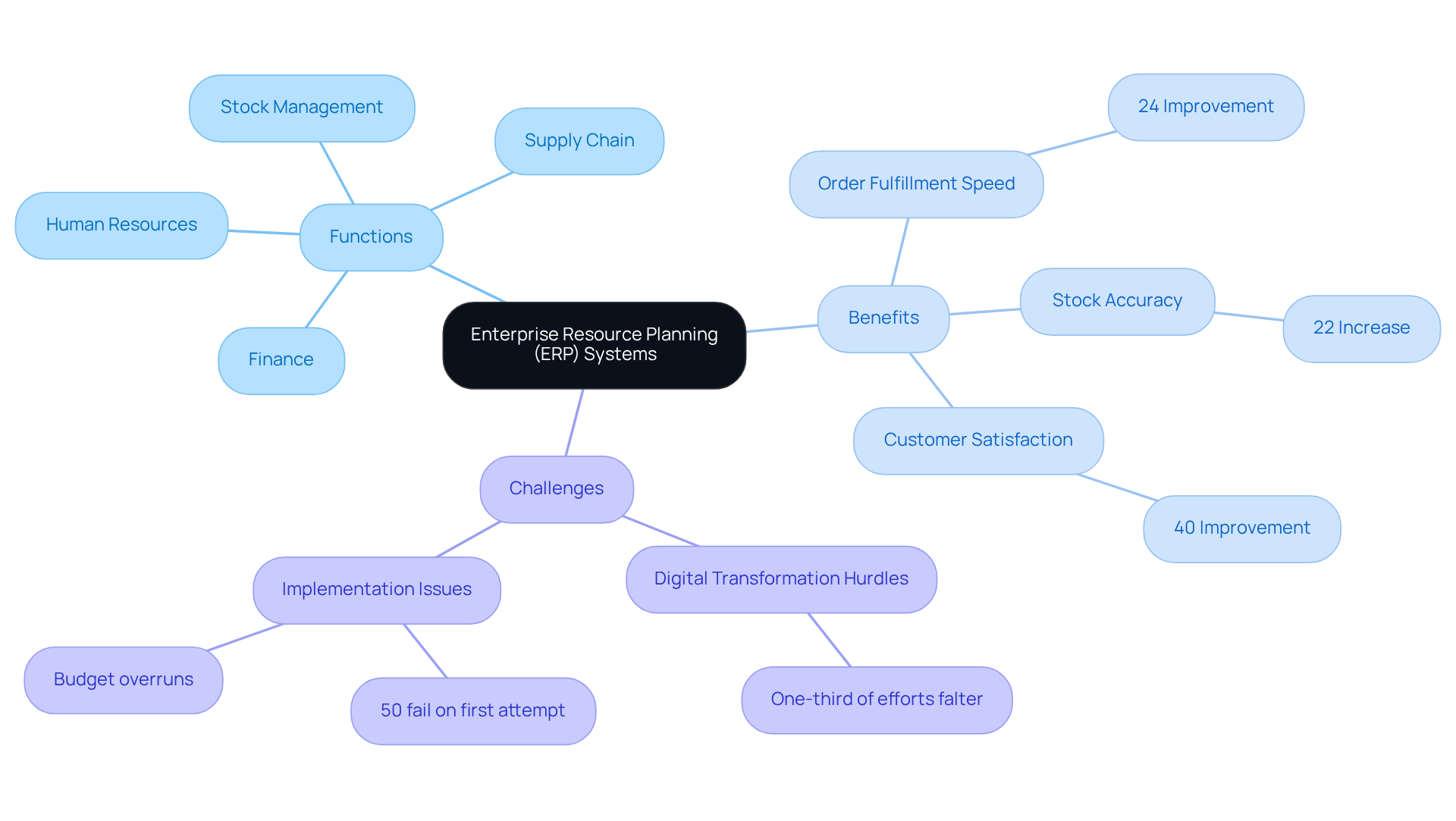
Trace the Evolution: The History and Development of ERP Systems
The ERP system meaning emerged in the 1960s, initially with inventory management solutions that were essential for monitoring stock levels as businesses expanded. As organizations faced increasing complexities, the necessity for integrated solutions became apparent. By the 1990s, the ERP system meaning was formally adopted, signifying a broader scope that encompassed finance, human resources, and numerous other business functions. The advent of cloud technology in the 2000s represented a significant transformation, allowing ERP solutions to become more accessible and scalable for organizations of all sizes.
Today, platforms such as 10X ERP leverage cloud capabilities to enable real-time data processing and seamless integrations, effectively tackling the unique challenges encountered by distributors. This progression has led to substantial improvements in operational efficiency, with 66% of organizations reporting enhanced performance due to the ERP system meaning. As we approach 2025, the ERP landscape continues to evolve, with an anticipated market growth rate of 10% annually, underscoring the vital role these tools play in modern business operations.
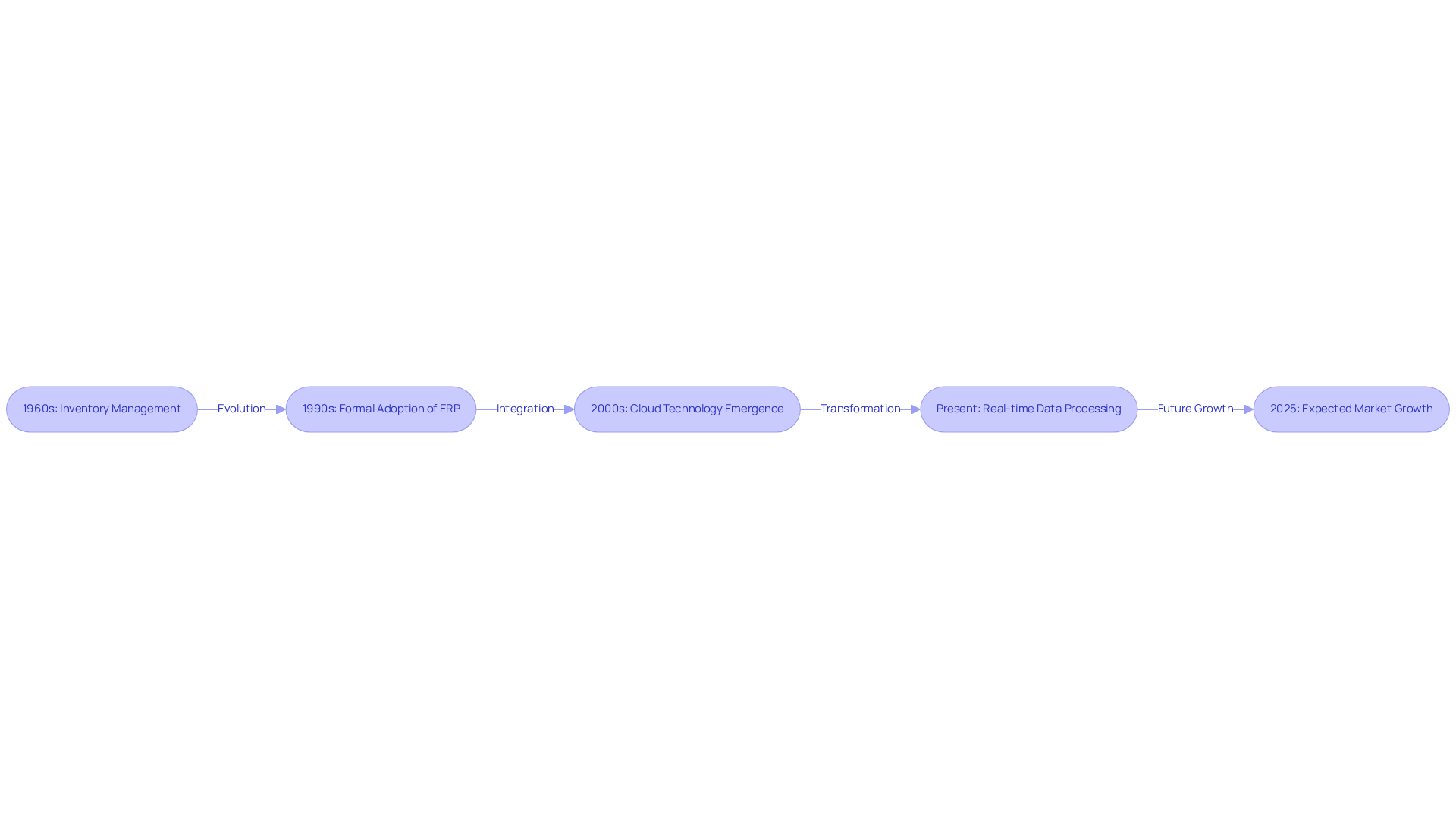
Explore Key Features: Core Components of ERP Systems
The fundamental elements of the ERP system meaning encompass crucial modules such as accounting and stock management, vital for achieving operational success. The accounting module in 10X ERP distinguishes itself through its real-time data processing capabilities and comprehensive reporting features, empowering stakeholders to make informed decisions swiftly. This module not only expedites daily transactions but also ensures compliance, significantly enhancing financial management.
In the realm of stock management, 10X ERP provides advanced features like lot and serial tracking, granting businesses complete visibility over stock levels. This capability is essential for improving stock turnover and reducing carrying expenses. Moreover, the seamless integration of applications enhances operational capabilities, facilitating a more cohesive workflow across departments.
Practical examples illustrate the impact of these modules: firms utilizing 10X ERP have reported improved accuracy in stock levels and a reduction in operational errors, leading to increased productivity. The significance of effective inventory management cannot be overstated, as it directly influences cash flow and overall business agility. By automating these processes, 10X ERP not only streamlines operations but also equips businesses to respond more adeptly to market demands, ultimately driving growth and profitability.
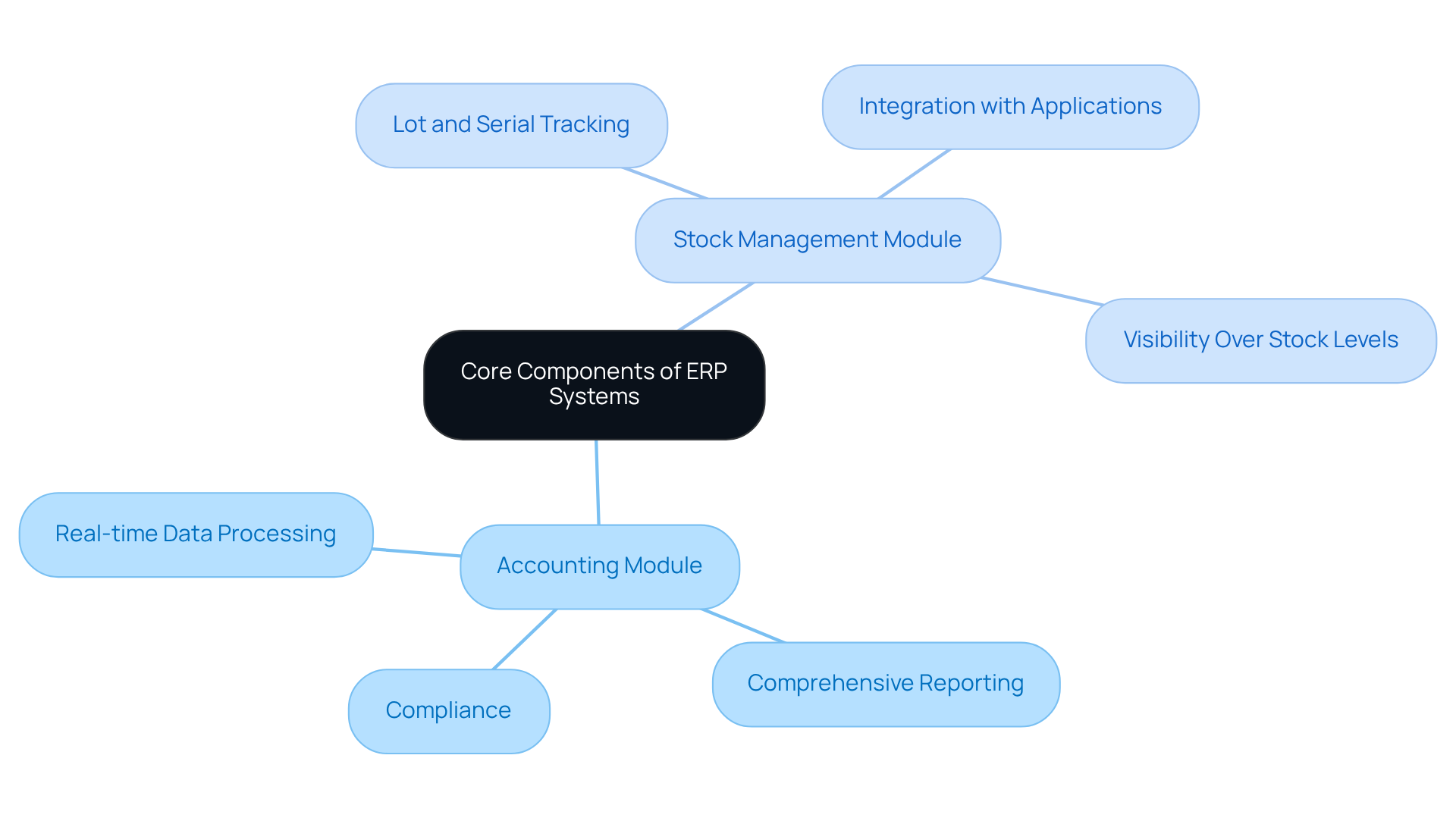
Recognize the Importance: Benefits of Implementing ERP Systems
The ERP system meaning encompasses a wealth of benefits, including improved efficiency, enhanced data accuracy, and superior decision-making capabilities. For distributors, the ERP system meaning is important, as systems like 10X ERP effectively tackle common challenges, including the management of multiple software systems and the necessity for real-time data availability. With its cloud-based architecture, 10X ERP ensures a seamless user experience and a rapid onboarding process, enabling organizations to minimize downtime and swiftly reap the rewards of their investment.
By centralizing operations, businesses can significantly reduce operational costs, elevate customer satisfaction, and promote collaboration across departments. Moreover, the transparent pricing structure of 10X ERP guarantees that companies fully comprehend the value they are receiving, facilitating easier scalability as they expand. Equipped with best-in-class accounting, inventory management, and unlimited integrations, 10X ERP empowers distributors to optimize their inventory management and enhance operational flexibility effectively.
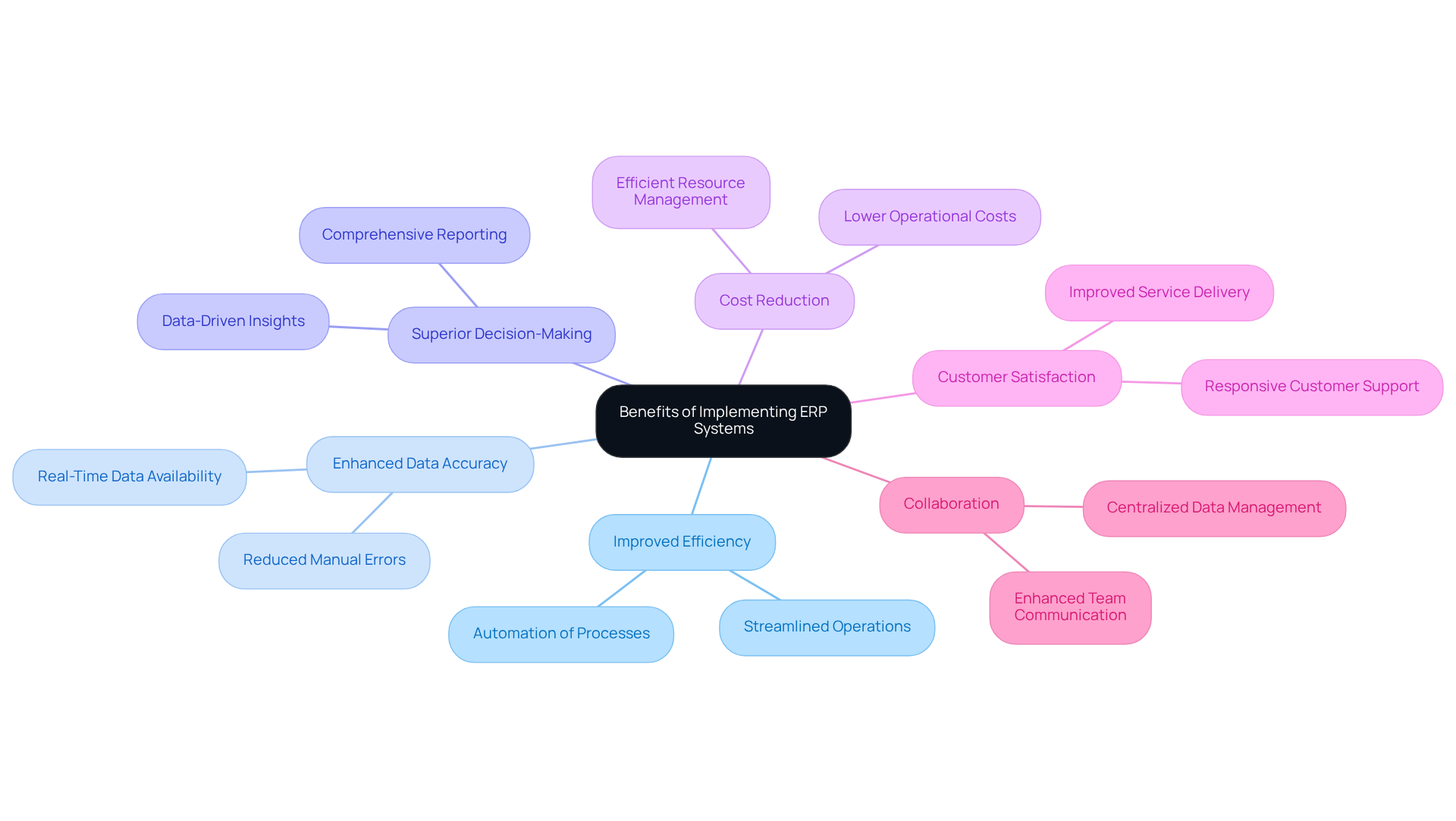
Conclusion
Understanding ERP systems is crucial for organizations striving to enhance efficiency and decision-making capabilities. These comprehensive platforms integrate essential business functions and facilitate seamless communication across various departments, ultimately driving operational success. The significance of ERP systems lies in their ability to provide real-time data access and improve overall business agility, particularly in an increasingly competitive landscape.
Throughout this article, key insights have been presented regarding the evolution, core features, and benefits of ERP systems. From their origins in inventory management to the modern cloud-based solutions like 10X ERP, the journey of ERP systems illustrates a commitment to improving business processes. Essential components such as accounting and stock management empower organizations to streamline operations and enhance customer satisfaction. Furthermore, data reveals that businesses adopting ERP solutions experience marked improvements in order fulfillment speed, stock accuracy, and overall efficiency.
As organizations navigate the complexities of digital transformation, the importance of implementing robust ERP systems cannot be overstated. Businesses are encouraged to assess their needs carefully and consider the advantages these solutions offer. By investing in an effective ERP system, companies can optimize their operations and position themselves for sustainable growth and success in an ever-evolving marketplace.
Frequently Asked Questions
What is an ERP system?
An ERP (Enterprise Resource Planning) system is a comprehensive software platform that organizations use to oversee and automate essential business processes by integrating functions across finance, human resources, supply chain, and stock management.
How do ERP systems facilitate business operations?
ERP systems facilitate seamless information exchange among different departments, enabling businesses to optimize operations and enhance decision-making.
What is the significance of cloud-based ERP solutions?
Cloud-based ERP solutions provide real-time data access and collaboration capabilities from any location, which is particularly beneficial for growing distributors.
Can you give an example of a cloud-based ERP solution?
10X ERP is an example of a modern cloud-based ERP solution that enhances operational efficiency through features like real-time data processing and adaptable user permissions.
What benefits do companies experience after adopting ERP solutions?
Companies adopting ERP solutions report a 24% enhancement in order fulfillment speed, a 22% rise in stock accuracy, and improved customer satisfaction, with 40% of users noticing significant enhancements.
What percentage of organizations experience improved processes after implementing ERP?
95% of organizations implementing ERP systems experience improved processes.
How does ERP adoption impact company growth?
70% of companies that adopt ERP solutions assert that it has facilitated smoother growth.
What challenges are associated with ERP implementation?
Nearly one-third of digital transformation efforts falter due to challenges related to ERP implementation, highlighting the need for meticulous planning and execution.
